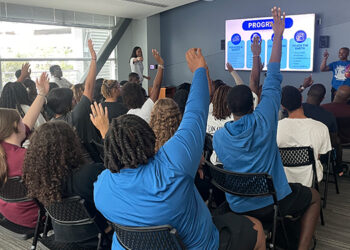At the beginning of the year, it’s always a prime time for campus recreation and wellness departments to capitalize on the “new year, new me” crave. It’s a time where we can connect with students who are excited and ready for a healthy behavior change.
However, the challenge becomes how do we build a connection that lasts? How do we fortify a connection that ensures students are supported throughout the year and find ways to stay engaged? Although there’s no singular answer or magic bullet, here are a few things to keep in mind as you think about and reflect on lessons learned in 2023 and preparing for 2024:
1. Continue to Assess Your Population.
Due to the everchanging complexity of our students, it’s essential we continue to assess the needs of our population. Using tools such as annual surveys and focus groups helps us to identify specific health concerns facing our student body. The data from these assessments can be used to guide future direction for programs, events and services. With most budgets being tight, the goal is put money, time and effort into ideas that serve the needs of the university.
2. Let Your Students Lead in Health Promotion.
Gen Z — also known as the zoomers — are quite different then our generations from the past. This new generation has not responded to the traditional health education workshops and general outreach that has been successful with previous generations. They are interested in quick, innovative, and engaging programming that builds connection and educates at the same. Therefore, our peer health education team has played an integral part in program development that fits the specific needs and wants of this generation. Students know students. Hence, our peer educators have led the charge in modifying current programming and bringing in new programming, such as Friendship Speed Dating at the Fitness Center. We have seen a significant increase in engagement and success of programs transformed and developed based on their recommendations.
3. Promote Transformational Learning Experiences to Improve Student Connection.
As a department, we normally see about 50% of our student population. Our goal every year is to improve that number as much as possible. One way that we’ve been able to increase engagement is through our collaboration with academics. Our department often serves as a learning lab for students enrolled throughout the university. Building a partnership with the academic colleges across campus using out-of-classroom opportunities has allowed us to improve connection with students who may not have ever connected with us before. These transformational learning experiences we have implemented over time include internships, graduate assistantships, service-learning projects and volunteering. Practical experiences as such allow students to use what they have learned in the classroom outside of it.
Furthermore, students that participate with us through these experiences often become integrated with our department because they learn the benefit of our services and programs. Our main goal via the experiences is to offer students opportunities that are relevant and challenging and that support academic success, professional development and skill building.
Subscribe here to stay up-to-date on all the articles of Campus Rec Magazine.










